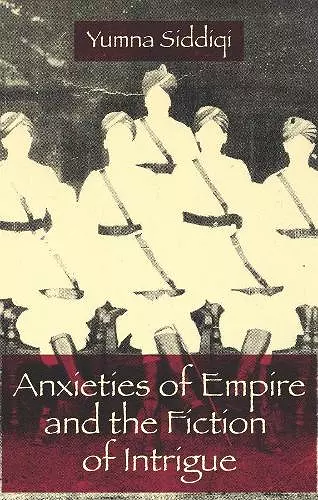Anxieties of Empire and the Fiction of Intrigue
Format:Hardback
Publisher:Columbia University Press
Published:4th Apr '08
Currently unavailable, and unfortunately no date known when it will be back

Anxieties of Empire is a probing, original account of nineteenth- and twentieth-century detective fiction from Britain and India that reveals the genre's preoccupation with the old and new empires, with national boundaries and the state. The book brings together a wide range of materials and important fictional texts to produce a fascinating historical and literary trajectory of the 'fiction of intrigue' and its afterlives in postcolonial and Anglophone novelistic traditions. Yumna Siddiqi's methodological precision and cultural histories reveal manifold layers of narrative complexity even as she moves the discussion seamlessly between imperial metropole and postcolony. This book will prove valuable reading for all literary scholars, but especially for scholars in nineteenth-century, Victorian, and postcolonial cultural studies. -- Betty Joseph, Rice University, author of Reading the East India Company 1720-1840: Colonial Currencies of Gender In this lucid and wide-ranging book, Yumna Siddiqi explores the intimate connections that exist between power and narrative. Her study begins by looking closely at what she calls 'fictions of intrigue' during the height of Britain's colonial empire, in the late nineteenth and early twentieth centuries, showing how certain imperial anxieties found relief in various storytelling strategies. From there, she moves into an examination of the so-called New Empire, following the persistence of certain narrative strategies in the postcolonial world. Her critiques of such writers as Amitav Ghosh, Arundhati Roy, Salman Rushdie, and Michael Ondaatje are deeply considered, and revelatory. This is an important book, not only for postcolonial studies but also for literary studies in the broadest sense. -- Jay Parini, author of One Matchless Time: A Life of William Faulkner Yumna Siddiqi makes a timely and compelling argument for reading contemporary anxieties of empire in the related genres of detective and spy fiction. Her book is a richly rewarding, engaging, and provocative study that reads classic spy thrillers and detective stories of the late colonial period in counterpoint to contemporary classics of postcolonial fiction. This exciting new contribution compels us to read the formulae of detective and spy fiction with a fresh critical sense of urgency. -- Chris GoGwilt, professor of English and comparative literature, Fordham University
Focusing on late nineteenth- and twentieth-century stories of detection, policing, and espionage by British and South Asian writers, this title presents an exploration of the cultural anxieties created by imperialism. It reveals how British writers express the anxious workings of a will to maintain imperial power in their writing.Focusing on late nineteenth- and twentieth-century stories of detection, policing, and espionage by British and South Asian writers, Yumna Siddiqi presents an original and compelling exploration of the cultural anxieties created by imperialism. She suggests that while colonial writers use narratives of intrigue to endorse imperial rule, postcolonial writers turn the generic conventions and topography of the fiction of intrigue on its head, launching a critique of imperial power that makes the repressive and emancipatory impulses of postcolonial modernity visible. Siddiqi devotes the first part of her book to the colonial fiction of Arthur Conan Doyle and John Buchan, in which the British regime's preoccupation with maintaining power found its voice. The rationalization of difference, pronouncedly expressed through the genre's strategies of representation and narrative resolution, helped to reinforce domination and, in some cases, allay fears concerning the loss of colonial power. In the second part, Siddiqi argues that late twentieth-century South Asian writers also underscore the state's insecurities, but unlike British imperial writers, they take a critical view of the state's authoritarian tendencies. Such writers as Amitav Ghosh, Michael Ondaatje, Arundhati Roy, and Salman Rushdie use the conventions of detective and spy fiction in creative ways to explore the coercive actions of the postcolonial state and the power dynamics of a postcolonial New Empire. Drawing on the work of leading theorists of imperialism such as Edward Said, Frantz Fanon, and the Subaltern Studies historians, Siddiqi reveals how British writers express the anxious workings of a will to maintain imperial power in their writing. She also illuminates the ways South Asian writers portray the paradoxes of postcolonial modernity and trace the ruses and uses of reason in a world where the modern marks a horizon not only of hope but also of economic, military, and ecological disaster.
[A] well-written and scholarly work. English Literature in Transition 1880-1920
ISBN: 9780231138086
Dimensions: unknown
Weight: unknown
304 pages